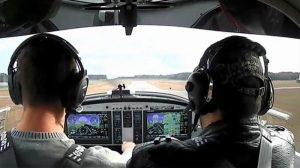 I recently read an article that listed a number of problems with teaching millennials to become pilots. It was clear an assumption was made by the author that growing up in a high-tech world does not jive with old-school aviation technology. Yes, the characteristics of millennials differ from earlier generations, but don’t all generations have a degree of individuality? Rather than writing off an entire generation, I started thinking about how to embrace it while taking a deeper look at my own values. What I discovered was a need to change some of my own processes, not theirs.
I recently read an article that listed a number of problems with teaching millennials to become pilots. It was clear an assumption was made by the author that growing up in a high-tech world does not jive with old-school aviation technology. Yes, the characteristics of millennials differ from earlier generations, but don’t all generations have a degree of individuality? Rather than writing off an entire generation, I started thinking about how to embrace it while taking a deeper look at my own values. What I discovered was a need to change some of my own processes, not theirs.
As flight instructors, it is not enough to just teach our students to fly safely. We need to foster a learning environment that encourages students to expand their horizons and spark a never-ending quest for knowledge. This approach ultimately creates safer, better-informed pilots. I’ve found that millennials are some of the most inquisitive learners—not because they don’t have or can’t find the easy answers, but because they are trying to positively influence an outcome using all available information. To me, this sounds a bit like a recipe for promoting risk management, aeronautical decision making, and judgment.
 When inquiring minds want to understand, instead of spouting off facts and figures, challenge your students with a problem that they should try to solve through their own research. Use scenario-based training to discuss alternatives that lead to a safe outcome when a hazard is present. Here is where it really gets important: Try to refrain from restricting research or alternatives to the methods you are familiar with. Let your students find resources that speak their language. Let’s face it, we all learn differently and our world is full of information. Millennials grew up in a connected world where access to information is an assumed right. Not everyone is going to be as passionate as you are about the same things that you are, and if they are, it might not be for the same reasons.
When inquiring minds want to understand, instead of spouting off facts and figures, challenge your students with a problem that they should try to solve through their own research. Use scenario-based training to discuss alternatives that lead to a safe outcome when a hazard is present. Here is where it really gets important: Try to refrain from restricting research or alternatives to the methods you are familiar with. Let your students find resources that speak their language. Let’s face it, we all learn differently and our world is full of information. Millennials grew up in a connected world where access to information is an assumed right. Not everyone is going to be as passionate as you are about the same things that you are, and if they are, it might not be for the same reasons.
For example, I was recently talking with a freshly minted flight instructor who had never used the “blue lever” (referring to the propeller control). Their training through commercial pilot was done in a technically advanced aircraft with a FADEC, so they never needed to manage a constant speed propeller manually. I was surprised initially, but then realized it was a sign of innovation—and there’s nothing wrong with that! The instructor knew their limitations and, more importantly, wanted to learn more, so I challenged them to research the blue lever from the perspective of teaching others about it. Sometimes there’s no better way to learn than by teaching.
I’ve found that millennials have open minds and are constantly seeking new tools to work with. If we want to encourage our students (and pilots in general) to learn new tricks, shouldn’t we set an example? When I did my flight training a couple of decades ago, I did NDB approaches and calculated wind triangles. When I transitioned to glass, I found someone far more experienced with the equipment and took an online course. One of my best tutors was actually a sport pilot who knew the menus inside and out. He was a great teacher (and software developer). I recognized how he was strong in the areas where I was weak. As we flew together, we taught each other new techniques. The point is that, when we want to grow, we should surround ourselves with people who are smarter than us.
 Millennials are often characterized as being skeptical. When someone questions a process you are teaching, rather than being dismissive, respond with a challenge. Encourage them to do their own research and then consider alternative viewpoints. Most likely, you’ll also learn something new. If you’re reluctant to embrace new knowledge, the flight deck will quickly become plagued with distrust. Millennials have a desire to learn—just realize that they may learn differently than you did. Ultimately, this will demonstrate your desire to support the team, which is a critical component of crew resource management.
Millennials are often characterized as being skeptical. When someone questions a process you are teaching, rather than being dismissive, respond with a challenge. Encourage them to do their own research and then consider alternative viewpoints. Most likely, you’ll also learn something new. If you’re reluctant to embrace new knowledge, the flight deck will quickly become plagued with distrust. Millennials have a desire to learn—just realize that they may learn differently than you did. Ultimately, this will demonstrate your desire to support the team, which is a critical component of crew resource management.
People come from different backgrounds and experiences. Previous generations also faced opposition (you can probably think of some areas that frustrated you too). Take solace in the fact that Millenials will have their own struggles teaching generation Z. Soon, we’ll have pilots whose first time burning any liquid fuel will be on the flight deck of a regional jet. Think about it. There is a future generation that will learn to drive in an all-electric vehicle and later learn to fly in an all-electric airplane. Four stroke cycle engine, a thing of the past???
 Don’t write off an entire generation because someone doesn’t know how a carburetor works or has never changed their own oil—it doesn’t mean they will be any less safe than you are in the air. Embracing the differences in each other is a principle that we should all adhere to. This extends far beyond generational gaps. It can be applied to anyone with a different background, race, gender, etc. Regardless of whether you’re teaching millennials, or anyone else who isn’t exactly like you, work toward a greater purpose and work as a team. Inspire others by keeping an open mind. Welcome change and ask questions. Create a culture where others want to share their passion. Remember that a candle loses nothing when it ignites another.
Don’t write off an entire generation because someone doesn’t know how a carburetor works or has never changed their own oil—it doesn’t mean they will be any less safe than you are in the air. Embracing the differences in each other is a principle that we should all adhere to. This extends far beyond generational gaps. It can be applied to anyone with a different background, race, gender, etc. Regardless of whether you’re teaching millennials, or anyone else who isn’t exactly like you, work toward a greater purpose and work as a team. Inspire others by keeping an open mind. Welcome change and ask questions. Create a culture where others want to share their passion. Remember that a candle loses nothing when it ignites another.
Written by: Paul Duty (CFI, CFII, MEI, AGI), Chief Instructor and Aviation Product Manager.

